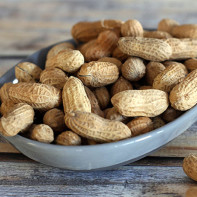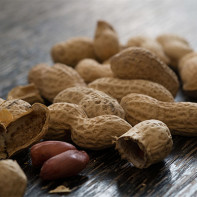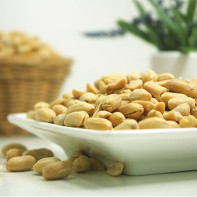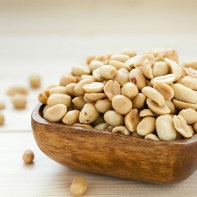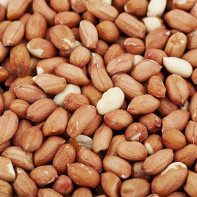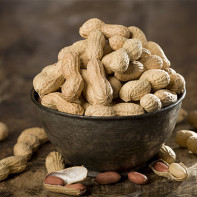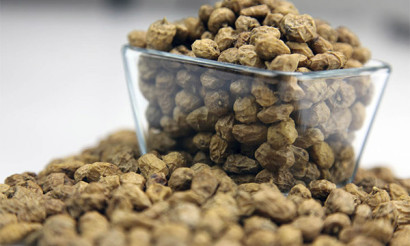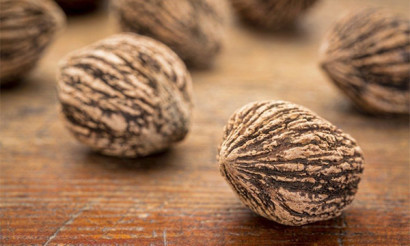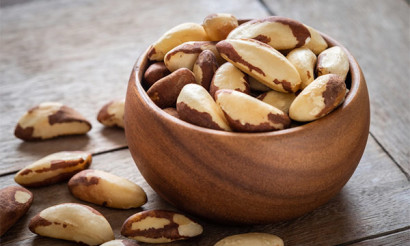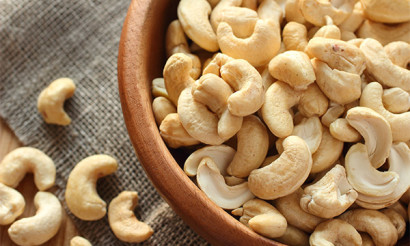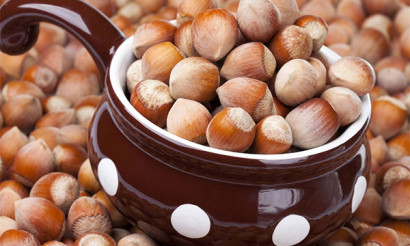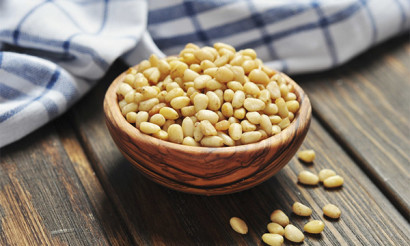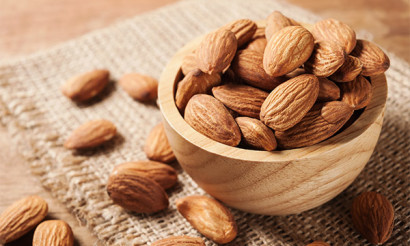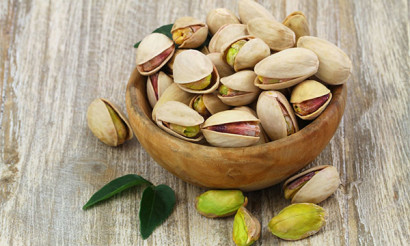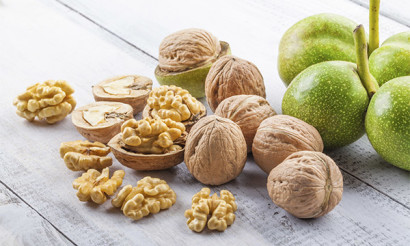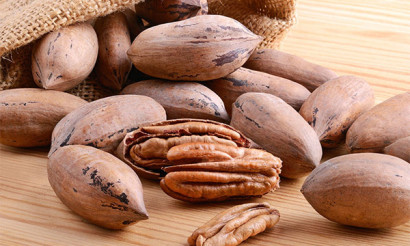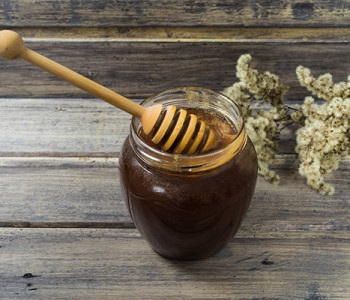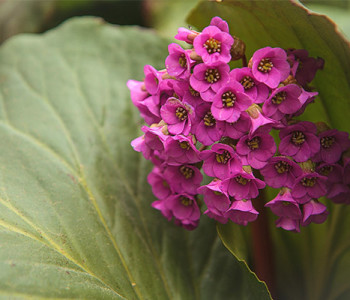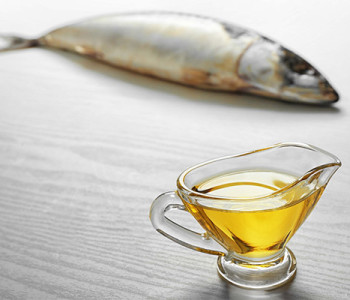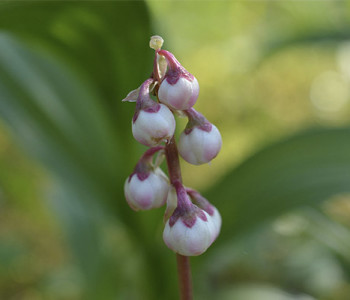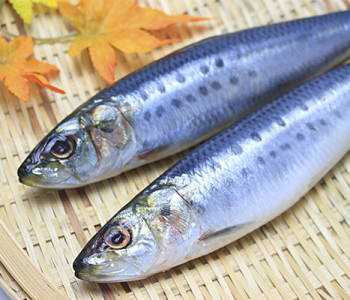Peanuts: benefits and harm to the human body
Peanuts are an annual bean plant. Although everyone refers to nuts, this is not true.
- Where it grows and what peanuts look like
- Composition and calorie content
- What are the benefits of peanuts?
- General benefit
- For women
- For men
- During pregnancy
- When breastfeeding
- For kids
- Which peanuts are healthier: raw or roasted?
- The benefits of peanut husks
- The benefits of peanuts with honey
- Peanut Urbech: benefits and harms
- Can I eat peanuts when losing weight?
- Peanuts in medicine
- With diabetes
- With pancreatitis
- With gastritis
- For the intestines
- For constipation
- With gout
- For the liver
- With hemorrhoids
- Peanut-based traditional medicine recipes
- Peanut Milk
- Peanut Broth
- Hypertension Peanut Vinegar
- Peanuts in cosmetology
- For face
- For hair
- Harm and contraindications
- Symptoms of Peanut Allergy
- How to Pick and Store Peanuts
- How to eat peanuts
- How much can you eat per day
- Can I eat at night and on an empty stomach
- Is it possible to eat with husk
- Is it possible to eat in a post
- Do I need to wash peanuts before eating
- How to Roast Peanuts
- In the pan
- In the microwave
- In the oven
- Do I need to wash peanuts before frying
- How to peel peanuts quickly
- What can be made from peanuts: recipes
- Peanut paste
- Kozinaki
- Halva
- Can peanuts be given to animals
- Interesting Facts
Where it grows and what peanuts look like
The culture is grown in territories of countries with a warm climate, namely in South America, which is its homeland, as well as China, Argentina and some regions of the United States.
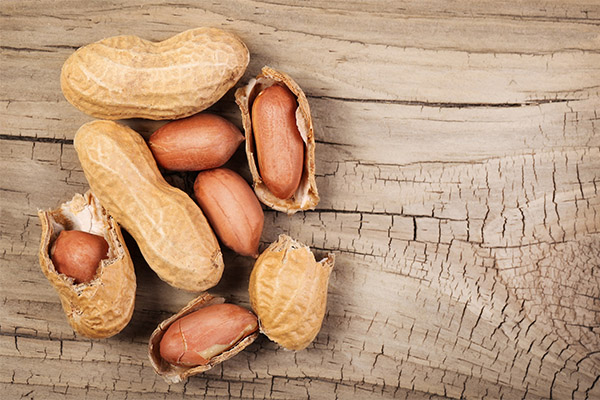
At the moment, China is the largest supplier and producer; it exports 60% of the total world peanut volume. But the best quality is different peanuts, which grows in Argentina and the United States. This is due to the fact that the climate and soil have the most favorable character for growing.
Argentina has now increased the size of the area for planting 4 times. And it was this that helped lower the price of the product, and also began to grow even rare varieties such as Runner and Redskin. In Argentina, sowing begins in November. Peanuts are growing throughout the winter, and by May harvesting and delivery is already underway. Sending begins in a month - in June.
Interestingly, the second name of peanuts is peanuts, although the fruit has nothing to do with nuts. It grows on a bush in the form of beans, on a stem, and the root system is in the ground. But the process of full ripening of the pods takes place in the ground, since the original birthplace of the fruit was a desert and arid places. So that the beans do not dry, but retain moisture, they must be in the ground.
From the place where peanuts grow, all its special qualities depend: color, size, taste and oiliness. For example, large beans grown in China have absolutely no taste or smell, and sweet Indian beans are very small. That is why at the moment the best representatives of this culture are Argentineans. All varieties grown on the territory of this country have the correct shape, size and sweet taste, which should be inherent in the fruit.
Composition and calorie content
Peanuts are rich in vitamins, amino acids and minerals. It contains in large quantities vitamins of group B, E, H, PP and minerals (potassium, copper, zinc and silicon). They are contained there in larger quantities than in other representatives of legumes.
The energy value per 100 g of peanut kernels is 550 kcal, while proteins - 26 g, fats - 45 g and carbohydrates - 10 g.
It is because of the high fat content that the use of peanuts during a diet must be reduced. At the same time, it should not be completely abandoned due to the fact that a high content of nutrients balances the body's work with a diet.
What are the benefits of peanuts?
General benefit
The vitamin complex present in peanuts:
- useful for maintaining and improving the condition of the skin, hair;
- calms the nervous system;
- normalizes the work of the gastrointestinal tract, intestinal microflora;
- regulates pressure, and is suitable for both hypertensives and hypotensives;
- suitable for regulating the functioning of the heart muscle.
The beneficial effects of vitamins on the human body must be considered in more detail.
- B vitamins (B1, B5, B6, B9) contribute to the accelerated healing of lesions of the gastric mucosa, intestines and blood vessels. Peanuts and butter from it are mandatory for people who have undergone surgery. Also, the product is useful for diseases of the stomach and is even indicated for gastritis. A sufficient amount of this group in the body helps to improve the condition of the skin, hair and bone tissue.
- Vitamin E helps with disorders of the heart muscle, it is also called the vitamin of youth and beauty. It promotes collagen production, which prevents premature wrinkles.
- Vitamin PP ensures the normal functioning of the digestive tract. Its deficiency in the body is fraught with disorders of the digestive and nervous systems.
- Silicon, like Vitamin E, produces collagen.
- Magnesium reduces the risk of hypertension.
- Iron strengthens bone and muscle mass.
- Zinc prevents the onset of cirrhosis and immunodeficiency.
For women
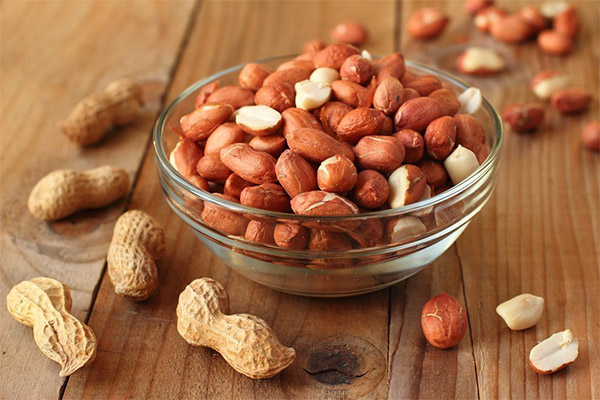
- Antioxidants (vitamin E and zinc) reduce the growth of breast cancer and even cysts.
- The product normalizes the hormonal background, reduces the symptoms of premenstrual syndrome, improves the functioning of the sex glands.
- Peanuts are a natural remedy for infertility, it also improves the condition of hair, nails and skin, eliminates depression and mood swings.
For men
- Methionine, which is found in large quantities in beans, promotes the production of adrenaline.
- The product cleanses the body of toxins, promotes the processing of fat.
- Peanuts have a beneficial effect on the sexual function and vital activity of sperm, accelerates the restoration of strength and energy balance.
During pregnancy
- Vitamin B9 is necessary during gestation, it reduces the risks of pathologies and inhibition of fetal development, and also reduces the likelihood of problems in the mother.
- Folic acid is necessary for women in expectation of a baby, it contributes to the well-functioning work of the reproductive system, favorable development of the fetus, as well as easy pregnancy.
- Due to the fact that the fats that are part of the composition do not contain cholesterol, their use does not bear any negative consequences, such as complicated absorption.
Cautions for use - allergies and gas formation. Like all legumes, peanuts are difficult to digest. Therefore, when symptoms of bloating and gas formation occur, it must be excluded from the constant diet.
When breastfeeding
Due to the high protein content in some cases, peanuts may even be recommended by doctors. It helps to strengthen bone and muscle mass, which is necessary for the baby.
Minerals and vitamins strengthen the immune system of the baby, which is necessary in the first months of life, and also contribute to the speedy recovery of women after childbirth.
The inclusion of peanuts in the diet should be approached with great caution due to the fact that it is a strong allergen. Therefore, use should start with 2–4 pieces per day. After that, it is important to monitor the reaction of the child. With a normal reaction and the absence of signs of allergies, you can continue to use.
For kids
Peanuts are the only representative of legumes that can be given to a small child.
- Vitamin A strengthens the immune system and eye muscles.
- Vitamin D is especially needed for children who live in a cold climate and lack of sun.
- Eating peanuts strengthens the nervous system, reduces the risk of overexcitation and improves sleep.
You need to add the product to the diet with half a teaspoon of ground fresh peanuts per day, tracking the condition and reaction of the child's body.
Which peanuts are healthier: raw or roasted?
Comparing raw and roasted peanuts, do not forget that when cooking the beneficial properties of the bean are not lost, remaining in it fully.
Do not forget that, like all legumes, peanuts are difficult and long absorbed by the body due to the presence of vegetable fats. Therefore, all assurances that unprepared peanuts are more useful should not be believed. Raw peanuts can cause great damage to the digestive system. And the husk, which is impossible to get rid of without drying the fruits, can clog the intestines and thereby provoke constipation.
Raw peanuts also quickly go bad and mold. Often it is completely invisible, so a person can consume beans with toxic substances in high concentrations, which leads to poisoning and negative consequences.
Therefore, we can conclude that peanuts are strongly recommended to be consumed only in a fried form without the addition of flavors and colorants in the form of chocolate, salt or sweet powder.
If you want to include raw peanuts in the diet, then after consultation with a gastroenterologist and in the absence of stomach and intestinal problems, you can do this.
The benefits of peanut husks
Peanuts have 2 peels - one is dense, which protects the fruit from the negative effects during plant growth, the second is thinner, covers the bean itself. There are no special warnings, except for diseases of the stomach and intestines.
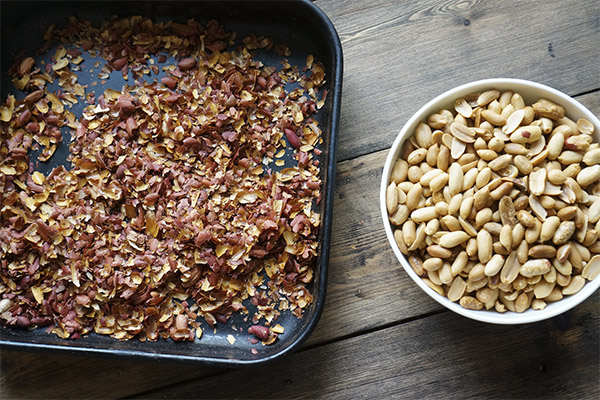
It has a bitter taste, but this does not particularly affect the taste characteristics of the fetus itself. Therefore, in the absence of contraindications, you should not be afraid to use it. And one cannot ignore the fact that the husk is widely used in folk medicine to enhance immunity. Tincture is made of it by pouring vodka on the skin (you need to insist it for several days, after which take 10 drops per day).
It is also used as a fertilizer for indoor plants. The husk needs to be poured with hot water and left in the bottle for several days, after which non-flowering deciduous plants should be added to the ground.
The benefits of peanuts with honey
It's no secret that honey has a large list of useful micro and macro elements, and in combination with peanuts gives the body double benefits. Such a treat has healing, antiseptic, soothing, and also anti-cold properties. That is why, in order to improve the state of health or maintain its normal state in the absence of allergies or other contraindications, it is good to use peanuts with honey in a teaspoonful course once a day for 14 days. It can be consumed both in the morning on an empty stomach and at night.
To prepare a useful composition, you need to fry the beans and, having cleaned them, grind and pour honey 1: 1. After this simple procedure, a healthy treat is ready to eat.
In this case, you must be sure that there is no allergy to one of the ingredients. With extreme caution, the drug should be used during pregnancy, during lactation, as well as children and people with hypersensitivity to any component.
Peanut Urbech: benefits and harms
Urbech is a mass of finely divided peanut kernels. The paste-like mixture is achieved due to the high oil content in the beans. After cooking, the mixture is ready for use, both as an independent dish, and as an additive to pancakes, pancakes and just with bread.
- Due to its high protein content, it is recommended for use by people who lead an active lifestyle, and athletes. And magnesium and potassium are necessary for those whose work is related to mental activity, since these elements improve memory and attention.
- It is also recommended for liquid blood to improve coagulation and during the recovery period after a heart attack or for prevention.
- Urbech should be included in the diet for people whose activities are related to the nuclear industry, since peanuts can break down radionuclides.
- It helps during colds, as it helps strengthen immunity and faster recovery, is a better source of energy and mood.
In case of abuse, urbec can cause irreparable harm to the body, cause allergic reactions, indigestion, weight gain, and also slow down the intestines. Therefore, people who have any contraindications or warnings, this sweetness must be abandoned.
Can I eat peanuts when losing weight?
Despite the high fat content, peanuts are a common dietary product. The root cause is that fats are uncomplicated and do not contain cholesterol. Therefore, they easily help maintain a figure by nourishing the body with everything necessary to maintain the health and full functioning of the internal organs, nervous system, bone and muscle mass, as well as improve the emotional state of a person.
During the observance of the regime and for the loss of extra pounds it is allowed to eat up to 12 kernels per day, while they need to be replaced with snacks. And eaten 2 beans before each meal will create a feeling of satiety and will reduce the portion of the main dish.
In no case, when losing weight, you can not eat a paste that contains a large amount of sugar. This not only does not help to get rid of extra pounds, but also in the shortest possible time will make itself felt by deposits of fat.
It is also better to eat peanuts in the morning, as it takes a long time to assimilate it by the body. That is why after 16 hours it is better to abandon its use.
Peanuts in medicine
For medical purposes, peanuts are especially indicated for vegetarians. Peanuts completely make up for the lack of meat in the diet, while hunger is not felt, problems with bones, muscles and skin are excluded.
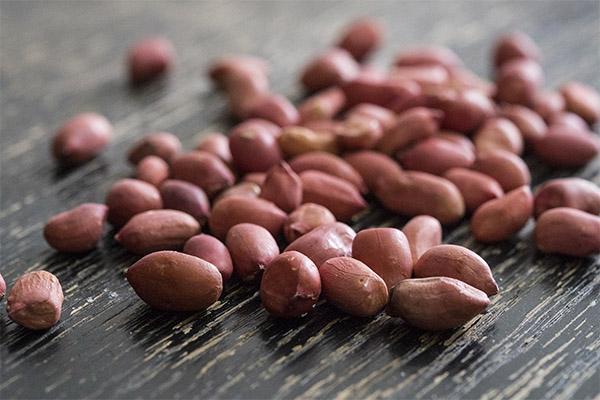
Also, the use of peanuts is recommended for stagnation of bile, diseases of the gallbladder and stomach. It strengthens the walls of blood vessels and gives them elasticity, which reduces the risk of arteriosclerosis, and also balances blood pressure.
Due to its ability to calm the nervous system, as well as serotonin, which is responsible for a good mood, it is necessary for people who are constantly stressed, and those whose work is associated with constant mental stress.
With the permission of the doctor, the nut is introduced into the diet for snacks - it quickly and permanently satisfies the feeling of hunger, while its moderate use does not provoke the problem of excess weight.
With diabetes
Peanuts are among the few legumes that are allowed in moderation and raw form to include in the diet of diabetics. This is argued by the fact that he:
- strengthens the walls of blood vessels;
- prevents the occurrence of blood clots and cholesterol plaques;
- removes toxins;
- lowers blood cholesterol;
- protects the liver from fat.
But if a diabetic suffers from obesity at any stage, peanuts must be ruled out. The same applies to diabetics who have gastritis or an ulcer in both acute and chronic form.
Important: The glycemic index of peanuts is 15 units.
With pancreatitis
In acute pancreatitis, it is strictly forbidden to include peanuts in the diet. This is due to the high fat content. The same applies to the chronic stage. The percentage of fat inherent in peanuts is unacceptable in pancreatitis. This can lead to the following consequences:
- activation of pancreatic enzymes;
- glandular tissue inflammation;
- nausea, diarrhea, increased pain;
- severe bloating and gas formation;
- destruction of the walls of the pancreatic ducts, which leads to deterioration.
The only deviation from this rule is the stage of disease retreat in remission, but only with constant medical supervision.
With gastritis
During gastritis, the patient must adhere to a strict diet both in the acute stage and in the presence of a constant problem that has flowed into a chronic form. If there is a disease, it is necessary to control the eaten fats, proteins and carbohydrates.
For this reason, the use of legumes in case of stomach problems should be reduced. But 50 g of peanuts per day is allowed, and in some cases even prescribed by doctors. The only caveat is individual intolerance. If there are pains of a different nature after eating peanuts, its use must be stopped.
For the intestines
Groundnuts help to improve intestinal muscle function. Fiber provokes its contraction, which helps to remove toxins and feces. In the absence of serious problems with the intestinal tract, peanuts will not provoke diarrhea and painful bowel movements. Therefore, the introduction of peanuts in the diet is necessary to maintain normal intestinal microflora and the prevention of constipation and disorders.
For constipation
Peanuts help fight constipation if bloating and flatulence are not detected. Vegetable fats normalize the work of the gastrointestinal tract and intestinal muscles, they break down stagnant stool and facilitate their excretion.
To get rid of this problem, even in the advanced stage, you need to do 2 fasting days, during which you need to eat peanuts (60-100 g per day) and drink at least 2.5 liters of water. Such a diet can improve the functioning of the intestines and help get rid of constipation. Of course, it can be included only in that situation if there are no other health problems and contraindications.
With gout
In the presence of gout, peanuts should never be consumed. Like all legumes, it contains purines that provoke the production of uric acid in the joints, which is fraught with increased and more frequent attacks of pain and a complication of the disease. That is why peanuts for gouty arthritis must be excluded from the diet.
For the liver
If the liver is healthy, peanuts can be eaten in any form, not exceeding the daily norm - 100 g. The presence of vitamin E promotes the renewal of organ cells, protects it from external stimuli.
In the presence of pathologies or diseases, a doctor’s permission to use peanuts is necessary. But most often it is allowed for use with the proviso that peanuts should be thermally processed, that is, dried in an oven, but not roasted.
With hemorrhoids
During hemorrhoidal disease, diet is always prescribed, and it is peanuts that are the No. 1 product for combating the disease. The thing is that a high fiber content (9.5% per 100 g of cores) helps to eliminate toxins, and also protects against cancer, which borders hemorrhoids of 4 stages. Therefore, at any stage of the disease, in the absence of other contraindications, peanuts should be among the main products.
Peanut-based traditional medicine recipes
Peanuts can rightly be called a panacea for all diseases, it has been treated for several centuries, using it in a variety of forms.
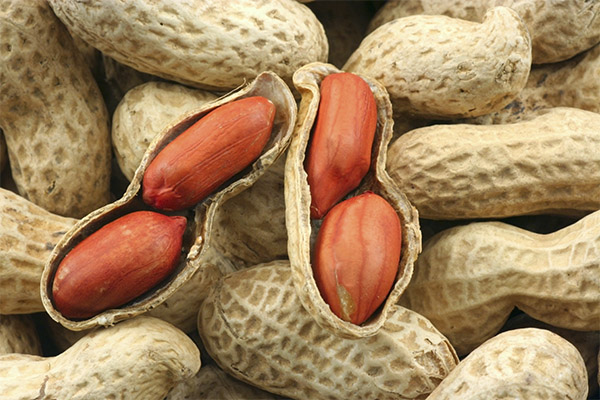
Peanut Milk
The remedy is indicated for such ailments as dizziness, colds, fatigue, drowsiness, distraction, respiratory diseases, diseases of the gastrointestinal tract, disorders of the cardiovascular system and others.
The recipe is simple - you need to dry the peanuts in the oven, and when the kernels have cooled, peel and grind them. Pour boiled milk (in the ratio of 1 tablespoon of crushed kernels to 1 cup of milk), stir and let it brew for 1-2 hours.
Take the drug before each meal at least 15 minutes, but not during an exacerbation of the disease.
You can use such a tool for prevention.
Peanut Broth
Such a decoction helps with diseases of the lungs and respiratory tract in both children and adults. 150 g of beans pour 0.5 l of cold water, and boil for 15-20 minutes. Take on an empty stomach for 30 days.It relieves inflammation in the bronchi, facilitates coughing up sputum. And chewing boiled kernels helps to return the voice.
Hypertension Peanut Vinegar
In a 1: 1 ratio, pour the raw kernels with vinegar, tightly closing, place in a dark place. After 24 hours, they are ready for use. After breakfast and dinner, you need to eat a few beans. Vinegar activates the action of vitamins (potassium, magnesium, phosphorus) found in peanuts, which are necessary with high blood pressure.
Peanuts in cosmetology
Seeking helpers in nature to preserve the beauty and youth of a woman began several millennia ago. It's no secret that the natural components contained in oils fight the problems of the skin and hair loss. That is why peanuts are widespread in the form of butter.
For face
Peanut butter, along with olive oil, was chosen as a leader among their own kind for use in cosmetology. Thanks to the presence of vitamin E and silicon, peanuts help tone the skin in a few procedures. The thing is that they activate the production of collagen, thereby relieving the skin from exhaustion, dryness and wrinkles, returning a healthy shade without spots and redness.
It is best for the face massage. It is necessary to apply a few drops of oil on the fingers, after which, starting from the forehead and ending with the decollete, drive it into the skin.
Peanut powder masks are also popular in South America. The dried kernels must be ground in a coffee grinder, then diluted with warm water until a homogeneous slurry is obtained and applied to the face. Leave on for 15 minutes, then rinse. This mask is suitable for combination and oily skin. Without oversaturated with oils and without making the skin even more oily, the beneficial elements of peanuts penetrate inside, improving its condition.
External use of peanut butter during pregnancy and the postpartum period is especially recommended. A change in the hormonal background malfunctions in the production of collagen, the skin changes its properties, becomes thinner, which leads to stretch marks, redness. Massages using peanut butter should be done daily, starting from an early date. This will provide the skin with the necessary elasticity and prevent the appearance of stretch marks. Therefore, peanut butter must be in the makeup bag of the expectant mother.
Hand massage helps to restore the skin, especially in winter, when it peels off from frost, water balance is disturbed. Oil massages nourish the skin with vitamins, micro and macro elements. The skin after the first massage will acquire a healthy look and will become soft and elastic to the touch.
For hair
The same goes for hair. Vitamin E has a beneficial effect on root bulbs, which activates the "asleep" and strengthens existing ones. The oil envelops the hair along the entire length, eliminating brittleness and cross-section of the ends, adding elasticity to the curls.
A few drops of oil can be added to shampoo or hair balm or applied as a mask. To do this, before applying to the scalp, you need to grind the oil between the palms of your hands, and then rub it with massage movements. Such a massage should last at least 5-7 minutes, then put on a hat and wrap a towel. Leave on for 20 minutes and rinse as usual.
Harm and contraindications
In most cases, it is raw peanuts that can do the most harm. Firstly, it refers to perishable products, due to which the fruits become toxic, and secondly, in this form it is worse and is absorbed by the stomach longer.
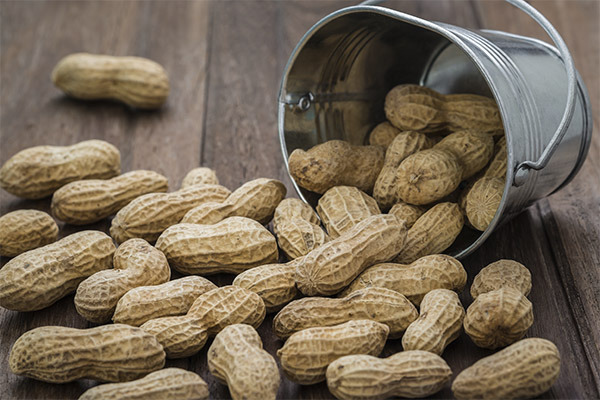
Peanuts are also considered the second strongest allergen after honey. Even one thing eaten can cause Quincke's edema. Therefore, for the first time you need to start with 1/5 of the bean.
You can not eat peanuts and those who have a pronounced expansion of the veins, as well as an increased content of platelets in the blood.
As for roasted peanuts, warnings are impaired functioning of the liver and gastrointestinal tract.
But in some cases, peanuts can be completely contraindicated:
- Obesity. Due to the high calorie content, peanuts should not be consumed. In people with impaired metabolism, it will lead to irreversible consequences and rapid weight gain. Also, with obesity at any stage, the liver slows down, and peanuts provoke a deterioration in its functioning.
- Gout, arthritis, arthrosis and other joint diseases. Purines contained in beans are a strong diuretic that promotes the release of uric acid in large volumes. This will aggravate the course of the disease, cause severe pain and nullify the effect of the drugs used.
- Thrombophlebitis and varicose veins. The substances contained in peanuts make blood thicker, which leads to blood clots. In order to avoid problems, people suffering from this disease, it is better not to eat peanuts.
- Loose bowels. Peanuts enhance bowel function and intestinal muscle contraction, causing painful diarrhea. Therefore, people with disorders should be treated with extreme caution in eating peanuts.
- Allergy. The sensitizing activity of peanuts is very high. Moreover, it can manifest itself in the most unexpected symptoms. Use should be handled with extreme caution and before eating, test each time, starting with 1 bean. The reaction to it can be very diverse - from redness to respiratory arrest. That is why allergic reactions need to be considered in more detail.
Symptoms of Peanut Allergy
Symptoms of an allergic reaction are usually divided into 3 types, depending on the strength of the action:
- Mild - itching, skin rashes (usually around the mouth), swelling of the lips, redness of the eyes, itching in the throat.
- Medium - vomiting, coughing, diarrhea, swelling of the throat, rash throughout the body.
- Severe - anaphylactic shock, pallor of the skin, drooping eyes, dizziness, loss of consciousness, drop in pressure and slowing of the pulse. A fatal outcome in the absence of assistance after an allergen enters the body occurs within a few hours.
If an allergy to the fetus has been detected, its use must be excluded in any form, including in the form of additives to dishes and desserts. Also, it can not be used in cosmetology.
To avoid a complicated reaction, it is necessary to test the effect of peanuts. It will be enough to break the core and the inside (it is more oily) to put on the back of the brush. In the presence of allergies, the reaction of the body will not take long. Redness and itching will begin within the first 30 seconds after contact.
The same applies to infants up to 3 months. A lactating woman needs to refuse or minimize the use of peanuts. Even if she does not have allergies, the child may have one.
How to Pick and Store Peanuts
To buy a good and tasty peanuts that will only benefit, you need to remember the following:
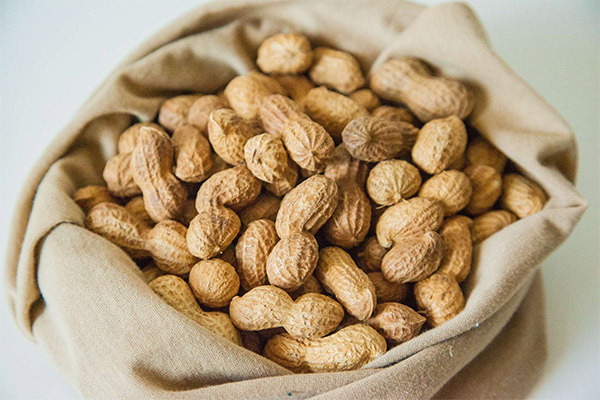
- Packaging must be transparent. When purchasing a nut, you need to inspect each nucleolus because they are infected with the fungus as soon as possible. That is why even if several seeds are missing, they cannot be purchased.
- There should be no plaque on the cores, the peel should be even, uniform color, without a specific smell.
- When purchasing a large number of beans, preference should be given to unpeeled shells. They definitely will not be spoiled and suitable for long-term storage.
- The choice of peanuts depends not only on taste preferences, but also on which method and shelf life will subsequently be used.
Peanuts can be stored in the refrigerator and even frozen, but only whole without damage. Crushed or damaged beans will lose oil from the cold, and with it the color and taste.
It is necessary to store kernels peeled in raw form in a sealed ceramic or glass bowl. Plastic promotes bitterness in beans. Roasted peanuts can be stored in bags made of cloth, but not in plastic bags - in them the fruits quickly suffocate and disappear.
Peanuts cannot be stored in open containers - air and other factors affect the taste and appearance of the beans.
How to eat peanuts
There are no clear rules on how to eat peanuts. It is only necessary to listen to the body, and also remember what diseases it is impossible to eat. But there are a number of issues that arise when including peanuts in a regular diet.
How much can you eat per day
The norm for a healthy person who does not have contraindications and allergies ranges from 50-100 g per day. Children should be given no more than 3 fruits per day, with a weekly rate of 9-10 pieces. Pregnant and lactating women need to listen to the recommendations of doctors.
Can I eat at night and on an empty stomach
Peanuts refers to foods that are approved for use on an empty stomach. Moreover, peanut butter is recommended to be drunk in the morning at least 30 minutes before the first meal. It will saturate the body.
As for the evening, beans should be discarded. They are high-calorie and absorbed for a long time, so they are better to eat until 15-16 hours of the day. Later there is a chance of gaining extra pounds, pain in the stomach.
Is it possible to eat with husk
The skin that covers the nucleus is very thin. If you use peanuts raw without any heat treatment, it will not cause harm. But depending on the variety and storage, it may be bitter.
Fried or dried kernels are best eaten peeled. This is due to the fact that due to the thinness and dryness of the husk, it can stick to the mucosa, irritating it. If it stays in the throat, it will lead to coughing attacks, and in the intestines - to constipation.
Is it possible to eat in a post
When fasting is not allowed to eat animal products. But for normal functioning, the body needs protein. And you can get it fully without feeling weakness and malaise, it is possible from legumes and nuts. Therefore, during fasting, peanuts, in the absence of contraindications, must be included in the daily diet.
Do I need to wash peanuts before eating
Like any product purchased raw, peanuts must be processed. It is best to soak it in cold water and leave for a couple of hours. Such treatment must be subjected to both peeled and shell kernels.
How to Roast Peanuts
Before frying, you need to pay attention to ensure that the peanuts are a uniform pinkish color, without black spots. After that, rinse the cores with water and dry. Next, you need to decide on a method that is more convenient. All of them are simple in operation and do not require special utensils.
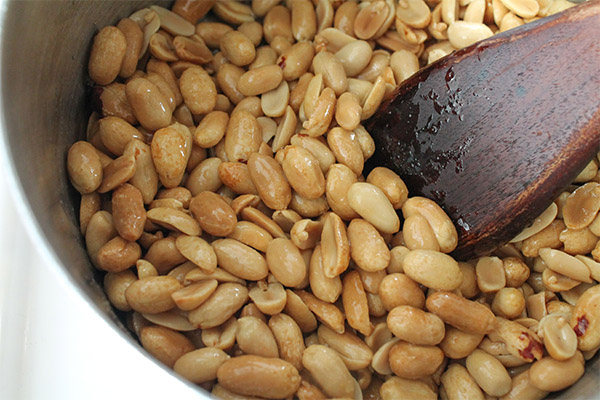
Peanuts without flavoring preserve more benefits, but if you want to salt, you need to sprinkle it with salt water before cooking.
In the pan
Frying the kernels in a pan, you need to lay them out in one layer. If the beans lie on top of each other, they will fry unevenly. It is necessary to heat the pan over high heat, then reduce the heat and, constantly stirring, fry them for at least 15 minutes. Then try peanuts or determine the degree of readiness by the state of the husk. If the kernels are fried, then the peel will begin to peel off. After that, let them cool.
In the microwave
Pour an even layer of the kernel onto the plate.Then, without covering the container, turn on the microwave at full power for 5 minutes.
In the oven
Put peanuts on a baking sheet with an even layer, then put it in a preheated oven for 20-30 minutes. After time, pull out and allow to cool.
Do I need to wash peanuts before frying
The question of whether it is necessary to pre-treat kernels before frying raises a lot of controversy. Some say that it is not necessary, because during cooking, high temperature will kill all bacteria. Others say that this procedure is necessary because peeled, pre-packaged peanuts deteriorate quickly, causing pathogenic bacteria to multiply instantly. But rinsing the product in a colander under cold running water will not be superfluous. In addition, this will save the nuts from the bitterness that is inherent in the peel.
How to peel peanuts quickly
There are 2 most convenient methods for peeling a raw kernel.
- Pour the kernels into the container and pour boiling water over them. After 7-10 minutes, the peel will begin to lag behind the bean. Drain and peel each nucleolus.
- Put peanuts in a bag and on a flat surface, without pressure, go over them with a rolling pin. The peel will peel off on its own.
What can be made from peanuts: recipes
In cooking, the use of peanuts is widespread, and in the preparation of not only desserts, but also sauces and main dishes. It gives them a piquant taste and aroma. But the sweets from it are especially popular.
Peanut paste
Pasta is perfect as a full breakfast, both adults and children love it. And it is prepared very easily and at no cost.
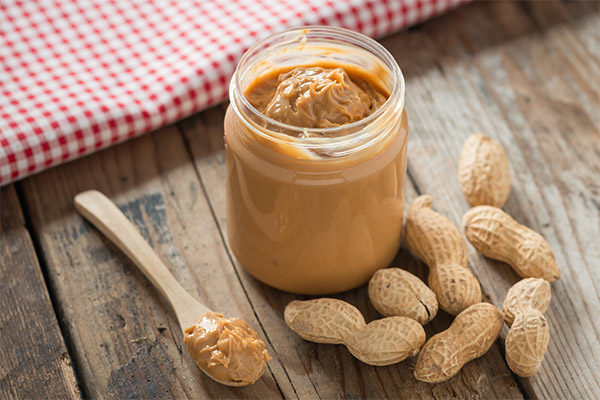
Dry in the oven 500 g of raw peanuts at a temperature of 180 degrees for 5 minutes. Then grind it in a blender as finely as possible. Add salt (1/2 teaspoon) and 1 tablespoon of vegetable oil. Stir again in a blender. If you want to make it sweeter, you can add a tablespoon of honey.
It is better to store the mass in a glass jar in a cool dark place.
Kozinaki
Sweetness can be a great snack during fasting or dieting. And it takes no more than 20 minutes to cook it.
Melt honey (50 g) and sugar (100 g) in a non-stick saucepan over low heat. Constantly mixing with a spatula, bring the mass to a homogeneous state and caramel color. Pour peanuts into syrup, mix and, without turning off the heat, put them in the molds with a spoon. It is necessary to constantly warm up so that the caramel does not freeze and is easily removed from the spoon.
Halva
Home-made halva differs in color from the purchase, the main reason for this is that it is made from natural ingredients, without any chemical additives.
For cooking, you will need semolina, roasted peanuts and melted butter 100 g each, sugar (200 g), water (0.5 l).
Heat the pan and pour semolina onto it, heat and pour half the oil. Fry until golden brown. Grind peanuts in a blender and fry in a second pan with the second half of oil. Mix both masses. Pour water into the pan, add sugar and cook until the water evaporates completely. Put the viscous mass into the mold and put in a cool place for a day.
Can peanuts be given to animals
Peanuts are the only ones from the legume family that can and should even be given to animals. This is done in order to prevent intestinal stagnation. Better yet, give it as a paste and add peanut butter to your regular meal. The amount depends on the size of the pet.
When giving a pet the first time, it is necessary to monitor whether it has allergic reactions or indigestion.
Interesting Facts
- The name peanuts was invented for a reason. The ancient Greeks, seeing this fruit, noticed that the drawing on it was similar to a spider, and called it αράχνη.
- In the state of Georgia in the USA, a peanut monument is erected.
- The stalks of the peanut bush are widely used in the agricultural industry, from which hay and fertilizers are made.
- Peanut peel is used to make plastic.
- Peanut butter is the main ingredient for nitroglycerin production.
«Important: all information on the site is provided exclusively in fact-finding purposes. Before applying any recommendations, consult with a profile specialist. Neither the editors nor the authors are liable for any possible harm caused materials. "

